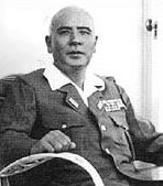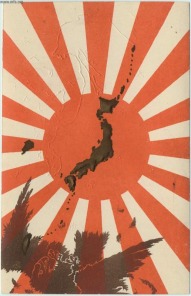The Japanese
"Across the sea, corpses in the waters;
Across the mountains, corpses in the fields,
I shall die only for the Emperor,
I shall never look back"
"Umi Yukaba", a Japanese song similar to "God Bless America".
Japan, an island nation slightly larger than California and with a population of 80 million people in the late 1930's, was ripe for rebellion. Nationalist organizations arose calling for expansion and unification of the world under Japan. These organizations were populated with idealistic young military officers disgusted with the corruption in the government and businesses, and the poverty at home. In February 1936 the extremists attacked the goverment; the rebellion was stopped, but the military used the fear caused by this event to assert their supremacy.
In July 1937 Japan launched a "punitive expedition against China", almost the entire Western world condemned Japan for these actions and American President Franklin D. Roosevelt called for an economic boycott against Japaan. At this time "The Imperial Way" raised its head, twisted into meaning that world order and peace would be achieved by Japanese control of East Asia, and was rousing millions with the call for a holy war to free Asia from both colonialism and Communism.
On September 27, 1940 Japan joined Germany, and Italy by signing the Tripartite Pack. The Japanese leaders thought this would keep peace in the Pacific, but America saw it as further evidence that Japan was no different than Germany and Italy with a goal of world domination.
And then there was December 7, 1941.....the Japanese had declared war on America with the attack on Pearl Harbor and the Phillipines.
The two Japanese officers most influential in the events surrounding the Death March:
General Masaharu Homma

General Homma was an interesting choice to lead the attack on the Phillipines; he was outspoken against the war, he despised Tojo, and he was something of an Anglophile and Ameriphile. When the allies surrendered he told his men to treat the prisoners with "a friendly spirit." After the war Homma was executed for war crimes, although the prosecution was unable to prove that he was aware of the atrocities his men were performing.
Colonel Masanobu Tsugi
Colonel Masanobu Tsugi was sent from the Japanese high command in reaction to General Homma's perceived inefficiency. He was a militant and a racist who believed that Japan should control all of the Orient. He directed the other officers to be ruthless to the prisoners. A few days after the surrender all of Homma's officers recieved a call from a "division staff officer." This mysterious caller, thought to be Tsugi, ordered the officers to "kill all prisoners and those offering to surrender." Fortunatly very few officers followed the order. Although almost certainly responsible, Tsugi's guilt was never established.

